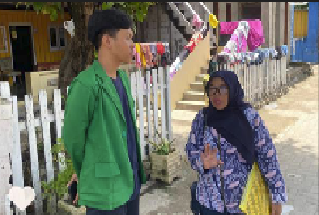Household waste management behavior
A study of community practices in Barrang Lompo Island, South Sulawesi
DOI:
https://doi.org/10.24252/sociality.v4i2.60180Keywords:
attitude, behavior, household waste, knowledge, waste managementAbstract
Previous studies on household waste management have predominantly focused on urban settings with established infrastructure, leaving a gap in the understanding of waste-related behaviors in remote island communities. This study explores the behavior of residents toward household waste management on Barrang Lompo Island, Kecamatan Sangkarrang, South Sulawesi. Employing a quantitative descriptive observational design, this research surveyed 307 respondents from a total of 1,324 households using non-probability convenience sampling. The independent variables included knowledge, attitude, and practice, while the dependent variable was household waste management. The results revealed that community knowledge was predominantly good (76.6%), although attitudes were mainly less favorable (60.2%), and actions were generally poor (51.5%). These findings suggest that while awareness is relatively high, it has not translated into consistent behavior, indicating a disconnect between knowledge and practice. The study underscores the urgent need for targeted environmental education, local regulation, and collaboration with public agencies to enhance sustainable waste practices. These implications are especially vital for remote and densely populated island communities where poor waste handling poses severe environmental and public health risks.
References
Abubakar, I. R., Maniruzzaman, K. M., Dano, U. L., AlShihri, F. S., AlShammari, M. S., Ahmed, S. M. S., Al-Gehlani, W. A. G., & Alrawaf, T. I. (2022). Environmental sustainability impacts of solid waste management practices in the Global South. International Journal of Environmental Research and Public Health, 19(19). https://doi.org/10.3390/ijerph191912717
Addahlawi, H. A., Mustaghfiroh, U., Ni'mah, L. K., Sundusiyah, A., & Hidayatullah, A. F. (2020). Implementasi prinsip good environmental governance dalam pengelolaan sampah di Indonesia. Jurnal Green Growth dan Manajemen Lingkungan, 8(2), 106–118. https://doi.org/10.21009/jgg.082.04
Axmalia, A., & Mulasari, S. A. (2020). Dampak tempat pembuangan akhir sampah (TPA) terhadap gangguan kesehatan masyarakat. Jurnal Kesehatan Komunitas, 6(2), 171–176. https://doi.org/10.25311/keskom.vol6.iss2.536
Bintara Birawida, A. (2021). Perilaku masyarakat dalam pengolahan sampah di Kepulauan Spermonde Kota Makassar. [Journal name if available], 4, [Pages if available].
Dewi, N. P. A. P., Madrini, I. A. G. B., & Tika, I. W. (2021). Efektivitas sistem pengelolaan sampah berbasis masyarakat (studi kasus: Desa Sanur Kaja Kota Denpasar). Jurnal BETA (Biosistem dan Teknik Pertanian), 9(2), 280. https://doi.org/10.24843/jbeta.2021.v09.i02.p15
DLHK. (2023). Dinas Lingkungan Hidup Kota Makassar. [Source/Website if available]
Eshete, H., Desalegn, A., & Tigu, F. (2023). Knowledge, attitudes and practices on household solid waste management and associated factors in Gelemso town, Ethiopia. PLoS ONE, 18(2), 1–13. https://doi.org/10.1371/journal.pone.0278181
Fadhullah, W., Imran, N. I. N., Ismail, S. N. S., Jaafar, M. H., & Abdullah, H. (2022). Household solid waste management practices and perceptions among residents in the East Coast of Malaysia. BMC Public Health, 22(1), 1–20. https://doi.org/10.1186/s12889-021-12274-7
Fadlilah, U., & Setiani, V. (2021). Analisis pemahaman tentang pengelolaan sampah komunitas bank sampah induk Surabaya (BSIS) melalui transfer knowledge. JST (Jurnal Sains Terapan), 7(1). https://doi.org/10.32487/jst.v7i1.1131
Ilma, N., Nuddin, A., & Majid, M. (2021). Perilaku warga masyarakat dalam pengelolaan sampah rumah tangga di zona pesisir Kota Parepare. Jurnal Ilmiah Manusia dan Kesehatan, 4(1), 24–37.
Izzati, F. A. (2021). Pentingnya sikap toleransi dan empati dalam mewujudkan warga negara yang baik (good citizenship) di masa pandemi. Jurnal Kalacakra: Ilmu Sosial dan Pendidikan, 2(2), 85. https://doi.org/10.31002/kalacakra.v2i2.4368
Kemenkes RI. (2021). Rencana aksi program pencegahan dan pengendalian penyakit. Rencana Aksi Program P2P, 2021, 86. http://www.jikm.unsri.ac.id/index.php/jikm
Miranda, B. (2023). Analisis willingness to pay (WTP) masyarakat terhadap peningkatan pengelolaan sampah melalui taman edukasi sampah Kelurahan Perumnas Waykandis, Kota Bandar Lampung. [Journal name if available], 7(March 2022), 83–90. https://doi.org/10.35472/jsat.v7i2.911
Nggilu, A., Raffi Arrazaq, N., & Thayban, T. (2022). Dampak pembuangan sampah di sungai terhadap lingkungan dan masyarakat desa Karya Baru. Jurnal Normalita, 10(3), 196–202.
Saparuddin, S., Juharni, J., & Nurkaidah, N. (2021). Implementasi kebijakan pengelolaan persampahan di Kecamatan Ujung Tanah Kota Makassar. Jurnal Paradigma Administrasi Negara, 3(1), 27–36. https://doi.org/10.35965/jpan.v3i1.596
Setiajaya, A., Lewis, H. F. A., Hasiany, S., & Zulaicha, A. S. (2023). Strategi pengelolaan sampah rumah tangga Kota Bandar Lampung (Studi kasus: Kelurahan Sukaraja). Jurnal Ilmu Lingkungan, 21(4), 807–818. https://doi.org/10.14710/jil.21.4.807-818
Syahrial, A., et al. (2021). Pengetahuan, ketersediaan fasilitas dan tradisi (kebiasaan) berhubungan dengan penanganan sampah rumah tangga di Pulau Balang Lompo Kabupaten Pangkajene Kepulauan. [Journal name if available], 2(6), 985–990.
Wetangamarang, W. J., Imamastri, M., Tang, P., Daik, T., & Tiansi, R. (2023). Dampak pembuangan sampah di pesisir pantai terhadap lingkungan. [Journal name if available], 1(5).

Downloads
Published
How to Cite
Issue
Section
License
Copyright (c) 2025 Munawir Amansyah, Muhammad Ridwan, Syarfaini Syarfaini

This work is licensed under a Creative Commons Attribution-NonCommercial-ShareAlike 4.0 International License.


